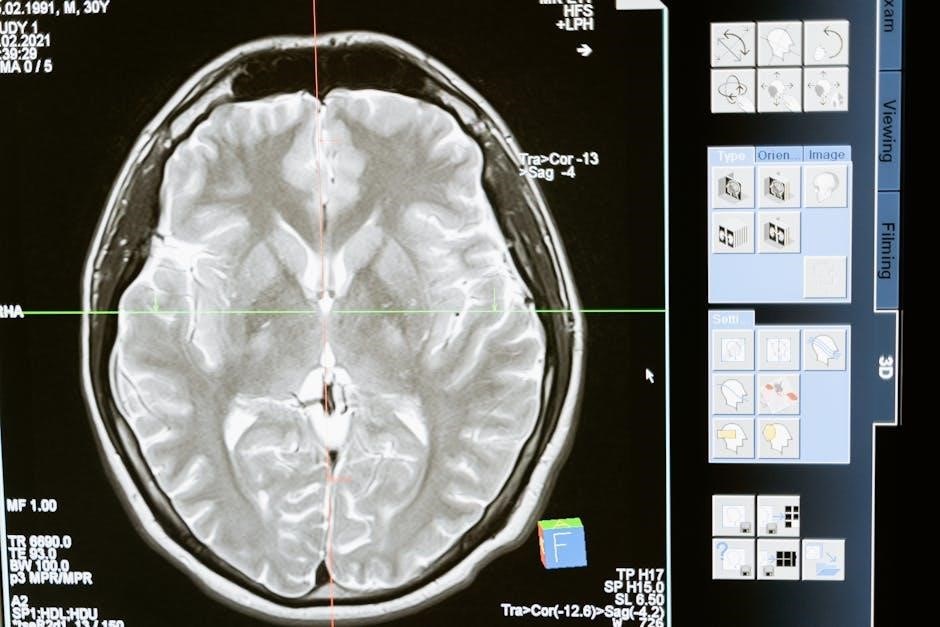The Denver Developmental Screening Test (DDST) is a standardized tool for assessing developmental progress in children from birth to six years. It evaluates motor‚ adaptive‚ language‚ and personal-social skills‚ providing early identification of potential delays. Widely used by professionals‚ the test is available in PDF format for easy access and administration.
Overview of the Denver Test PDF
The Denver Developmental Screening Test PDF is a comprehensive resource for assessing developmental milestones in children from birth to six years. It includes detailed test items‚ scoring criteria‚ and interpretation guidelines. The PDF format allows easy access and printing for administration in clinical and educational settings. It covers key developmental domains such as motor‚ adaptive‚ language‚ and personal-social skills. The test also incorporates tools like the PDQ-II (Prescreening Developmental Questionnaire) for initial assessments. Professionals use this standardized tool to identify potential delays early‚ ensuring timely interventions. The PDF manual provides clear instructions for test administration and result interpretation‚ making it a valuable resource for healthcare providers and educators.
Importance of Developmental Screening in Early Childhood
Developmental screening in early childhood is crucial for identifying delays early‚ enabling timely interventions. The Denver Test PDF highlights the significance of assessing motor‚ adaptive‚ language‚ and personal-social skills. Early detection of potential issues allows for targeted support‚ improving long-term outcomes for children. Tools like the PDQ-II facilitate initial assessments‚ ensuring children receive necessary resources promptly. Regular screening aligns with recommendations for well-child visits‚ emphasizing proactive approaches to health and development. This process not only aids in monitoring progress but also strengthens partnerships between parents‚ educators‚ and healthcare providers‚ fostering a supportive environment for children’s growth and well-being.

History and Evolution of the Denver Developmental Screening Test
The Denver Developmental Screening Test was first introduced in the 1960s. It evolved into the Denver II‚ incorporating new items and improving reliability in developmental assessments.
Development of the Denver II (DDST-II)
The Denver II (DDST-II) was developed to address limitations of the original Denver Developmental Screening Test. It introduced new test items‚ improving reliability and validity. The revised version incorporated standardized procedures‚ ensuring consistency in administration. The Denver II assesses developmental milestones across four domains: motor‚ adaptive‚ language‚ and personal-social skills. It was designed for children aged birth to six years‚ providing a comprehensive tool for early identification of developmental delays. The updates enhanced its effectiveness in clinical and educational settings‚ making it a widely accepted resource for professionals.
Key Updates in the Denver II Compared to the Original DDST
The Denver II introduced significant updates‚ including the addition of new test items and the refinement of existing ones. It replaced 69 original items with improved versions‚ enhancing reliability and accuracy. The test now includes standardized scoring criteria and age-specific norms for better interpretation. The Denver II also expanded the age range and improved the assessment of developmental milestones. These updates ensure earlier and more precise identification of developmental delays‚ making it a more effective tool for professionals compared to its predecessor.
Structure and Components of the Denver II
The Denver II assesses motor‚ adaptive‚ language‚ and personal-social skills in children up to six years. It includes standardized test items and scoring criteria for accurate evaluation.
Domains Assessed: Motor‚ Adaptive‚ Language‚ and Personal-Social
The Denver II evaluates four key developmental domains: motor‚ adaptive‚ language‚ and personal-social skills. The motor domain assesses gross and fine motor abilities‚ such as sitting‚ walking‚ and using hands. Adaptive skills focus on daily living tasks‚ like feeding and dressing. Language development measures verbal and non-verbal communication‚ including vocabulary and understanding instructions. Personal-social skills evaluate emotional and interpersonal abilities‚ such as smiling‚ playing with others‚ and showing affection. Together‚ these domains provide a comprehensive view of a child’s developmental progress‚ aiding in early identification of potential delays or challenges.
Test Items and Scoring Criteria
The Denver II includes specific test items to assess developmental milestones across four domains. Items are practical tasks‚ such as jumping over a test sheet or throwing a ball‚ designed to evaluate skills like motor coordination and language understanding. Each item is scored as “pass” or “fail” based on the child’s ability to complete the task. Scoring criteria are standardized‚ ensuring consistency in administration. The test items are age-appropriate‚ with clear instructions for examiners. Results are categorized into normal‚ caution‚ or delay‚ providing clear indicators for further evaluation or intervention.

Administration and Interpretation of the Denver II
The Denver II is administered using standardized test items and materials‚ with results interpreted based on age-specific criteria. Scores indicate normal development‚ caution‚ or delay‚ guiding further actions.
Step-by-Step Guide to Administering the Test
Administering the Denver II requires careful preparation and adherence to standardized procedures. Begin by gathering all necessary materials‚ including the test manual and items like balls or paper. Ensure the child is comfortable and engaged. The test is divided into age-specific tasks‚ such as jumping over a paper or throwing a ball. Each item is scored as “pass” or “fail” based on the child’s ability to complete the task. The examiner records observations and compares results to age norms. The process typically takes 20–30 minutes‚ with clear instructions provided for each activity to ensure accuracy and reliability.
Understanding Test Results: Normal‚ Caution‚ and Delay
The Denver II results are categorized into three outcomes: Normal‚ Caution‚ and Delay. A Normal result indicates the child is developing as expected‚ with no significant delays. Caution suggests potential developmental concerns‚ while Delay confirms significant delays in one or more domains. Results are based on age-specific norms‚ and professionals interpret scores to determine the appropriate classification. Normal results require routine monitoring‚ while Caution and Delay necessitate further evaluation or intervention. Accurate interpretation ensures timely support for children‚ aligning with their developmental needs and promoting early intervention when necessary.

Advantages and Limitations of the Denver II
The Denver II is a valuable tool for early detection of developmental delays‚ offering a comprehensive assessment of motor‚ adaptive‚ language‚ and personal-social skills. Its ease of administration and standardized scoring make it widely accessible. However‚ some items have shown poor reliability‚ and cultural biases may affect results. Despite these limitations‚ it remains a widely used and effective screening instrument for identifying developmental concerns in young children‚ aiding professionals in providing timely interventions.
Benefits of Using the Denver Developmental Screening Test
The Denver Developmental Screening Test (DDST) offers numerous benefits‚ primarily its ability to detect early signs of developmental delays in children. By assessing motor‚ adaptive‚ language‚ and personal-social skills‚ it provides a comprehensive overview of a child’s progress. The test is user-friendly‚ making it accessible for professionals and parents alike. Early identification allows for timely interventions‚ improving long-term outcomes. Its standardized nature ensures reliability across diverse populations. Additionally‚ the availability of the Denver Test PDF facilitates easy access and administration‚ making it a valuable resource for promoting early childhood development and supporting children with special needs.
Potential Drawbacks and Challenges
The Denver Developmental Screening Test (DDST) has some limitations. While it is effective for early detection‚ it may not always provide in-depth diagnostic insights‚ requiring follow-up assessments. Some items‚ particularly those retained from the original DDST‚ have been noted for poor reliability. Cultural biases and variations in test administration can impact results‚ emphasizing the need for trained professionals. Additionally‚ the test’s reliance on observational data may lead to subjective interpretations; Despite its widespread use‚ these challenges highlight the importance of complementary tools and expert judgment for accurate developmental assessments. Regular updates and proper training are essential to mitigate these issues.

Case Studies and Practical Applications
The Denver Test PDF is widely used in clinical settings to assess developmental milestones in children‚ aiding early detection of delays and guiding intervention strategies effectively.
Real-Life Examples of the Denver Test in Action
The Denver Test PDF has been instrumental in identifying developmental delays in children. For instance‚ a 2-year-old showing speech delays was assessed using the Denver II‚ revealing significant language deficits. Another case involved a 4-year-old with poor social interactions‚ where the test highlighted personal-social delays. In both cases‚ early intervention was initiated‚ demonstrating the test’s effectiveness in guiding targeted support. These examples underscore the practical application of the Denver Test PDF in real-world settings‚ emphasizing its role in improving developmental outcomes for children.
Role of Parents and Caregivers in Developmental Screening
Parents and caregivers play a vital role in developmental screening using the Denver Test PDF. They provide essential insights into a child’s daily behaviors and milestones‚ aiding professionals in accurate assessments. The Denver II includes tools like the PDQ-II‚ a prescreening questionnaire that parents complete‚ helping identify potential delays early. Parents’ involvement ensures a comprehensive understanding of the child’s abilities and challenges. Additionally‚ they can use the Denver Test PDF to track developmental progress‚ fostering collaboration with healthcare providers and early intervention when needed. This active participation empowers parents to support their child’s growth effectively.
Resources and References for the Denver Test
The Denver Test PDF and manual are available through Denver Developmental Materials‚ Inc. Visit their website or contact them at 1-800-419-4729 for access and support.
Where to Find the Denver Test PDF and Manual
The Denver Test PDF and manual are available through Denver Developmental Materials‚ Inc. Visit their official website or contact them at 1-800-419-4729 for direct access. The manual provides comprehensive guidance on administration and interpretation‚ ensuring accurate developmental assessments. Additionally‚ the PDF format allows for easy printing and use during screenings. For further assistance‚ you can reach out to their customer support at P.O. Box 371075‚ Denver. These resources are essential for professionals conducting the test‚ ensuring reliable outcomes in developmental screening and providing necessary support for accurate assessments.
Recommended Readings and Additional Tools
For deeper understanding‚ the HealthCheck Provider Manual offers detailed insights into developmental screening‚ including adaptations from the Denver II. The Bayley Scales of Infant Development is another recommended tool for comprehensive assessment. Parents and professionals can also explore the PDQ-II prescreening questionnaire for early detection of delays. Additional resources‚ such as the Denver Developmental Screening Test manual‚ are available through DDM‚ Inc.‚ providing in-depth guidance. These tools complement the Denver Test PDF‚ ensuring a well-rounded approach to developmental assessment and support for children’s growth and development.